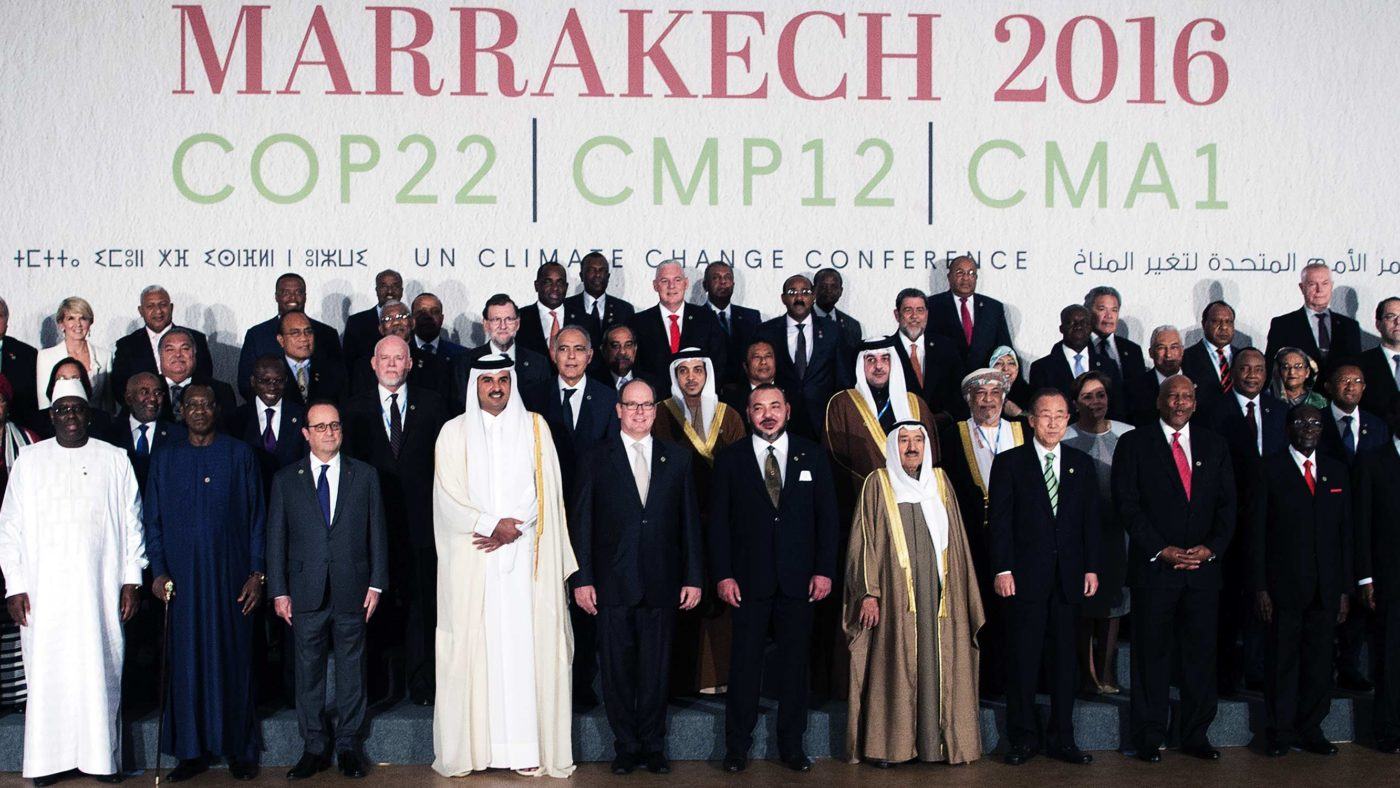Last December, under the cold grey skies of a Paris still reeling from the Islamist atrocities at the Bataclan, the countries of the world approved the Paris Agreement on climate change.
The first climate conference since the Paris Agreement came into force, taking place under the cloudless skies of Marrakech, should be an occasion for celebration and self-congratulation. But there’s little elation here.
The Paris Agreement was structured to avoid the test of a two thirds vote in the US Senate. The strategy depended on American voters supplying a climate-friendly successor to President Obama.
It didn’t turn out that way.
There is always something strange about climate conferences – this one being the 22nd “conference of the parties” (COP) of the 1992 UN climate change convention.
The most important citizens of the world appear at them – indeed, our age provides no higher form of cost-free virtue signalling than attendance at a COP. Yet what the negotiators are huddled together across to discuss is of mind-numbing tedium: deciding whether to hold a workshop, or to invite submissions from parties, or to ask for the climate secretariat to provide a synthesis paper.
This is an environment that is scripted and choreographed by the international bureaucrats. Government ministers have walk-on parts as servants of a process that the UN climate secretariat has set in motion – largely, save for when things get especially heated, to smile nicely and congratulate each other on their collective efforts in saving the planet from catastrophe.
This year’s COP is taking place in a series of temporary trade exhibition tents under the flight path of the local airport, as we’re reminded each time a plane takes off.
On the tarmac of Marrakech airport is what must be the world’s largest private jet – larger than Air Force One – belonging to the low-carbon state of Kuwait. Unsurprisingly, climate conferences are irony-free zones.
Participants are going about their COP business as if everything is normal. But President-elect Donald Trump casts a chilling shadow. For the delegates from the developed world, he threatens to single-handedly wreck their attempts to tackle climate change.
For those from the developing world, he threatens the lavish subsidies promised to help them cope. “My only worry is the money,” a delegate from the Democratic Republic of Congo told Reuters. “It’s worrying when you know that Trump is a climate sceptic.” Such candour is almost as hard to find here as irony.
Yet for no country does Trump’s election represent a greater strategic dilemma than for Britain.
The British delegation’s encampment is next to that of the United States in Pavilion Four of the conference Blue Zone. But spiritually and emotionally, it belongs two tents away, in Pavilion Two, with the rest of the EU.
Although Britain is formally leaving the EU, its climate and energy policies look set to remain exactly the same. Indeed, when it comes to climate and energy, Britain is being more Catholic than the Pope.
The German government has stated its intention to keep burning coal for at least the next two decades; Greg Clark’s business department has just launched a consultation on phasing it out by 2025.
That is unlikely to play well in Washington, to say the least. Coal is important to Republicans. Over the last two years, Britain imported 16.5 million tonnes of coal from America, worth $1.4 billion.
Four of the top five coal-producing states voted Republican – including Pennsylvania, which switched from the Democrats. Of the top 10 coal-burning states, seven voted Republican last week, including Vice President-elect Mike Pence’s Indiana and swing state Ohio.
An iron rule of American politics is that domestic politics trump international considerations. As Henry Kissinger told The Atlantic’s Jeffrey Goldberg after the election, Trump’s victory “could enable us to establish coherence between our foreign policy and our domestic situation”.
And it is very hard to envisage the Trump Administration looking kindly on a potential trade deal with a partner that is in the process of banning imports of American coal – and putting American miners out of work.
Coal is critical to maintaining the Republican majority in the Electoral College. It’s also critical to extending the Republican’s Senate majority in 2018.
Thirteen Democratic senators are fighting re-election in states Trump won or narrowly lost. These include West Virginia, the second-biggest coal producer and the state that gave Trump his second highest share of the vote last Tuesday, and Pennsylvania, one of the rust-belt states that doomed Hillary Clinton.
Democratic senators in Indiana (second top coal consumer) and Montana (fifth) are also up for re-election in 2018.
In other words, even if President Trump and his team were believers in climate change – which they very much are not – these simple electoral considerations would have profound implications for America’s future participation in the climate change process and in particular the Paris Agreement.
The Obama Administration’s Clean Power Plan constitutes America’s most important commitment under the Paris Agreement. Without the Clean Power Plan, America’s Nationally Determined Contribution under the Paris Agreement is a dead letter.
And under the Clean Power Plan, coal is the biggest loser: voters in coal-burning states can expect to see the biggest increases in their utility bills, as they are being forced to cut their emissions and replace cheap coal plant with costly wind and solar.
All this gives the new administration and Congressional Republicans compelling political reasons to find ways to at the very least rescind America’s commitments under the Paris Agreement, if not to abrogate it outright.
As for Britain, if it is to establish a viable basis for having a productive relationship with the United States over the next four years, it may have to choose between going green with Europe and the practical necessities of keeping America happy.


